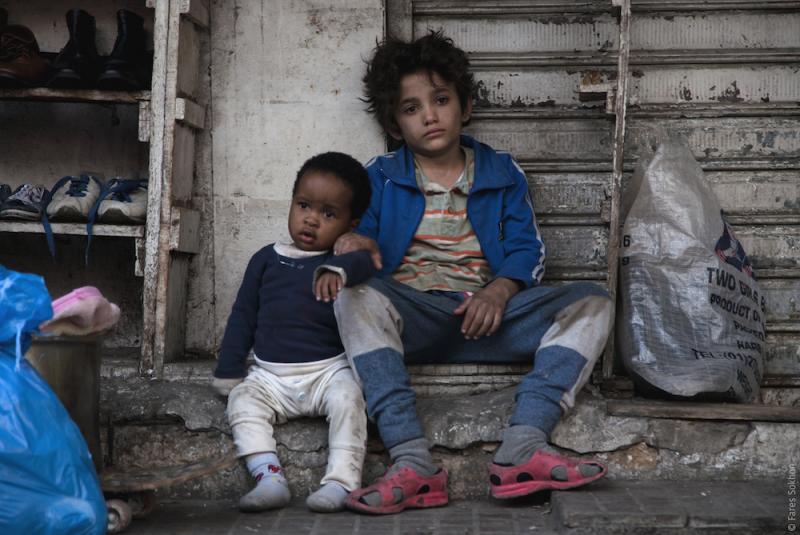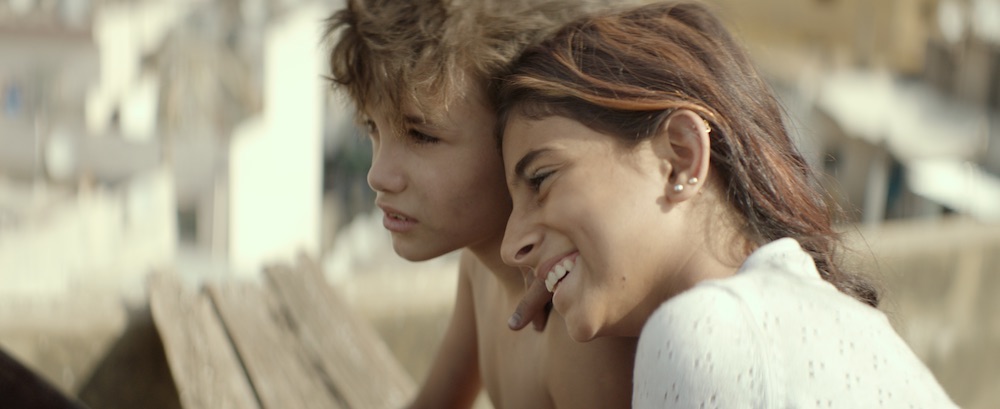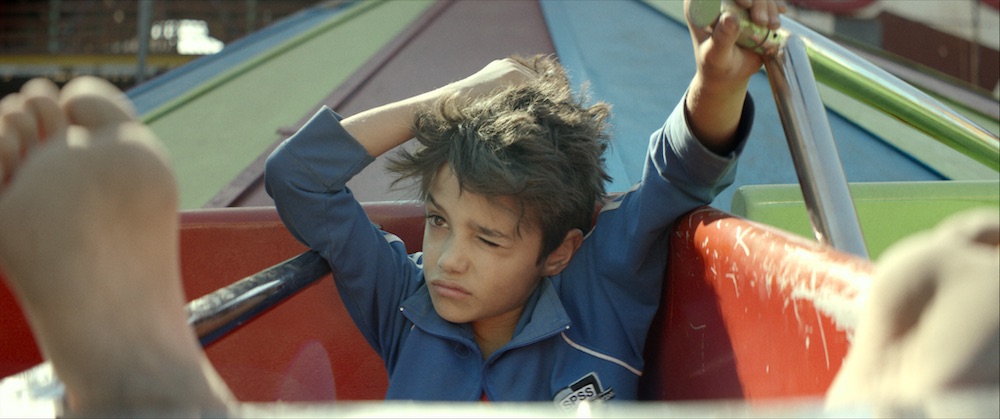Capernaum review - sorrow, pity and shame in the Beirut slums | reviews, news & interviews
Capernaum review - sorrow, pity and shame in the Beirut slums
Capernaum review - sorrow, pity and shame in the Beirut slums
Reality and fiction collide in Nadine Labaki's powerful exposé of Lebanese street children

An angry little boy, in jail after stabbing someone, stands in a Beirut courtroom and tells the judge that he wants to sue his parents. Why? For giving birth to him when they’re too poor and feckless to care for him. And he wants them to stop having children.
Fair enough. Director/writer Nadine Labaki’s Oscar-nominated third film – it also won the Jury Prize at Cannes last year - is in a different league to her two previous quite jolly features, Caramel and Where do we go now? It is a passionate indictment of the plight of Lebanese street children. Unregistered and without birth certificates or IDs, without rights to schooling or health care, they are neglected, abused, ignored by the state.
Capernaum, a French term meaning a place of disorder (confusingly, it’s also the name of a biblical village in Galilee) is almost a documentary. Labaki and casting director Jennifer Haddad found their actors on the street, living the lives they portray on screen, and the film is a mission statement. Filming took six months, research took four years. Reality and fiction constantly collide (even the courtroom scene features a real judge) and Christopher Aoun's cinematography shows us sweeping aerial views of a grey, jumbled, Beirut landscape.
It's certainly authentic. The actors didn’t learn lines; somehow Labaki and her crew slowly wove their plot around the people they found - no streets were closed off for shooting - and let life go on as they filmed in the souks and alleys. The result is sometimes almost too painful to watch, and you do long for a bit of respite. It’s overlong, as chaotic as its name, and the courtroom case, with the fumbling parents whining in response to Zain's condemnation, seems contrived. But there’s no denying the film's power.
Abuse, crime, jail, lack of documentation – all this is slum-dwelling Zain’s world. He is played by the extraordinarily charismatic 13-year-old Zain Al Rafeea, in reality a Syrian refugee, one of the millions living in Lebanon. He was illiterate when the film was made. After the courtroom scene, his life - the fictional one - is shown in flashback: he and his many siblings help their chaotic parents make a living by getting forged prescriptions for Tramadol from various pharmacies. They dissolve the crushed pills in water, steep clothes in it (the baby has to be chained up while this is done - health and safety) and deliver them to Zain’s brother in prison, who extracts and sells the liquid as Tramadol shots. Tasty.
 Tough, cursing Zain looks aggrieved yet also on the verge of tears, except when he’s with his 11-year-old sister Sahar (a delicate Cedra Izam, pictured with Zain, above), another street child who Labaki encountered selling chewing-gum. But somehow in spite of everything he’s developed a sense of honour and justice; he adores her and recognises the peril she’s in when her periods start (he turns one of his T-shirts into a sanitary pad and then starts stealing them for her from the supermarket). Now their parents can marry her off to the much older, predatory son of their shady landlord in exchange for some chickens. When this happens in spite of Zain’s attempts to stop them, he runs away in rage and despair, not that anyone notices much.
Tough, cursing Zain looks aggrieved yet also on the verge of tears, except when he’s with his 11-year-old sister Sahar (a delicate Cedra Izam, pictured with Zain, above), another street child who Labaki encountered selling chewing-gum. But somehow in spite of everything he’s developed a sense of honour and justice; he adores her and recognises the peril she’s in when her periods start (he turns one of his T-shirts into a sanitary pad and then starts stealing them for her from the supermarket). Now their parents can marry her off to the much older, predatory son of their shady landlord in exchange for some chickens. When this happens in spite of Zain’s attempts to stop them, he runs away in rage and despair, not that anyone notices much.
He ends up in an amusement park after meeting the eccentric Cockroach Man – a strange variant of Spiderman – on a bus. Things look up for a while. He finds affection and a fragile surrogate family with cleaner Rahil, an Eritrean illegal immigrant and her baby Yonas. Rahil (the wonderful Yordanos Shiferaw, who was arrested and had to spend two weeks in jail before the film producers got her out) has to take Yonas to work and hide him in the loo, so Zain’s a welcome addition – he can babysit while she’s working. Watching Zain take care of Yonas (the adorable Boluwatife Treasure Bankole – that baby - actually a girl - has got talent) is an extraordinary, funny, moving experience. Zain gives breast-fed Yonas his bottle (Rahil expresses milk for him before she leaves for work), entertains him by angling a mirror to catch the neighbouring shack’s TV cartoons while inventing a foul-mouthed soundtrack, keeps him out of harm’s way. They’re a happy little unit until one day Rahil doesn’t come back. Of course, she’s been arrested for lack of documentation, though she’s been trying desperately to find ways of getting legal status (this thread involves Cockroach Man, who also brings some light relief). Somehow Zain has to cope with poor Yonas alone, and it’s agonising to watch what he’s driven to do. He's longing for papers too so he can leave the country - Sweden is the promised land - and he wants to help Yonas in that direction. People-traffickers lie in wait.
Watching Zain take care of Yonas (the adorable Boluwatife Treasure Bankole – that baby - actually a girl - has got talent) is an extraordinary, funny, moving experience. Zain gives breast-fed Yonas his bottle (Rahil expresses milk for him before she leaves for work), entertains him by angling a mirror to catch the neighbouring shack’s TV cartoons while inventing a foul-mouthed soundtrack, keeps him out of harm’s way. They’re a happy little unit until one day Rahil doesn’t come back. Of course, she’s been arrested for lack of documentation, though she’s been trying desperately to find ways of getting legal status (this thread involves Cockroach Man, who also brings some light relief). Somehow Zain has to cope with poor Yonas alone, and it’s agonising to watch what he’s driven to do. He's longing for papers too so he can leave the country - Sweden is the promised land - and he wants to help Yonas in that direction. People-traffickers lie in wait.
It’s impossible, as you watch the credits roll and see the names of the countless judges, NGOs, social workers and detention centres that were involved in the film, to separate fact from fiction. Labaki, who has a cameo role as Zain’s lawyer, is making a documentary – she has also started a foundation - about the cast and what happens to them after the shoot. Zain is in Norway with his family, a fairy-tale success story, going to school for the first time; Cedra Izam has also been given a new start; but Treasure and her mother were deported to Kenya. No one emerged unchanged after making this film, says Labaki, and you believe her.
rating
Explore topics
Share this article
The future of Arts Journalism
You can stop theartsdesk.com closing!
We urgently need financing to survive. Our fundraising drive has thus far raised £49,000 but we need to reach £100,000 or we will be forced to close. Please contribute here: https://gofund.me/c3f6033d
And if you can forward this information to anyone who might assist, we’d be grateful.

Subscribe to theartsdesk.com
Thank you for continuing to read our work on theartsdesk.com. For unlimited access to every article in its entirety, including our archive of more than 15,000 pieces, we're asking for £5 per month or £40 per year. We feel it's a very good deal, and hope you do too.
To take a subscription now simply click here.
And if you're looking for that extra gift for a friend or family member, why not treat them to a theartsdesk.com gift subscription?
more Film
 Friendship review - toxic buddy alert
Dark comedy stars Tim Robinson as a social misfit with cringe benefits
Friendship review - toxic buddy alert
Dark comedy stars Tim Robinson as a social misfit with cringe benefits
 S/HE IS STILL HER/E - The Official Genesis P-Orridge Documentary review - a shapeshifting open window onto a counter-cultural radical
Intimate portrait of the Throbbing Gristle & Psychic TV antagonist
S/HE IS STILL HER/E - The Official Genesis P-Orridge Documentary review - a shapeshifting open window onto a counter-cultural radical
Intimate portrait of the Throbbing Gristle & Psychic TV antagonist
 Blu-ray: Heart of Stone
Deliciously dark fairy tale from post-war Eastern Europe
Blu-ray: Heart of Stone
Deliciously dark fairy tale from post-war Eastern Europe
 Superman review - America's ultimate immigrant
James Gunn's over-stuffed reboot stutters towards wonder
Superman review - America's ultimate immigrant
James Gunn's over-stuffed reboot stutters towards wonder
 The Other Way Around review - teasing Spanish study of a breakup with unexpected depth
Jonás Trueba's film holds the romcom up to the light for playful scrutiny
The Other Way Around review - teasing Spanish study of a breakup with unexpected depth
Jonás Trueba's film holds the romcom up to the light for playful scrutiny
 The Road to Patagonia review - journey to the end of the world
In search of love and the meaning of life on the boho surf trail
The Road to Patagonia review - journey to the end of the world
In search of love and the meaning of life on the boho surf trail
 theartsdesk Q&A: actor Emma Mackey on 'Hot Milk' and life education
The Anglo-French star of 'Sex Education' talks about her new film’s turbulent mother-daughter bind
theartsdesk Q&A: actor Emma Mackey on 'Hot Milk' and life education
The Anglo-French star of 'Sex Education' talks about her new film’s turbulent mother-daughter bind
 Blu-ray: A Hard Day's Night
The 'Citizen Kane' of jukebox musicals? Richard Lester's film captures Beatlemania in full flight
Blu-ray: A Hard Day's Night
The 'Citizen Kane' of jukebox musicals? Richard Lester's film captures Beatlemania in full flight
 Hot Milk review - a mother of a problem
Emma Mackey shines as a daughter drawn to the deep end of a family trauma
Hot Milk review - a mother of a problem
Emma Mackey shines as a daughter drawn to the deep end of a family trauma
 The Shrouds review - he wouldn't let it lie
More from the gruesome internal affairs department of David Cronenberg
The Shrouds review - he wouldn't let it lie
More from the gruesome internal affairs department of David Cronenberg
 Jurassic World Rebirth review - prehistoric franchise gets a new lease of life
Scarlett Johansson shines in roller-coaster dino-romp
Jurassic World Rebirth review - prehistoric franchise gets a new lease of life
Scarlett Johansson shines in roller-coaster dino-romp

Add comment